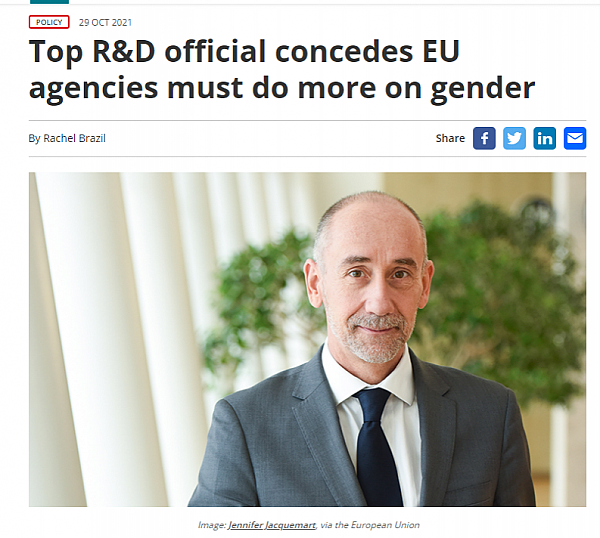Press Top R&D official concedes EU agencies must do more on gender
Jean-Eric Paquet says gender equality can be improved in research executive agencies and joint undertakings
As the European Commission pushes universities to do more on gender equality, its top R&D official, Jean-Eric Paquet, has admitted that bodies for which the Commission itself has responsibility also have room for improvement.
Speaking to the European Parliament’s research committee on 28 October, Paquet (pictured) said it was not acceptable that all three of the executive agencies that administer EU R&D funding and all eight of the EU-funded Joint Undertaking public-private partnerships were led by men.
“That I think is a real challenge and a real issue which will need to be corrected,” Paquet said of the executive agencies, adding that the Commission was “working on it”. He said recruitment proceedings for several executive agency positions would be launched shortly and that the Commission would be “particularly keen…to have female candidates so that possibly we could also appoint…women directors”.
He added that the EU was establishing several Joint Undertakings and renewing the mandates of some existing ones, presenting opportunities here too. He said: “You can count on Commission representatives in the board of these Joint Undertakings to prepare the ground with industry and national counterparts to ensure that we have…great applications from female candidates so that this situation can progressively also be addressed.”
Broader picture
Paquet painted a more positive picture of the gender balance in the Commission and his department more generally.
He said that his department had gender parity at senior management levels and that 57 per cent of middle-management positions in the department were occupied by women. More than 70 per cent of appointments in middle-management positions since Paquet took the top job in 2018 have been of women, he said.
According to Paquet, “women with great management talent are abundant in the Commission”, meaning it should be easy to find women to fill director-level posts.
He said that at levels below the top spot, the European Research Council Executive Agency “is essentially at parity” and that it was “very credible” that the European Research Executive Agency should be able to reach parity “in the short term”. While “a bit more effort” would be needed for the European Innovation Council and SME Executive Agency, achieving parity in the current Commission term was “absolutely credible”.
Paquet was responding to a question from the MEP Maria da Graça Carvalho, who tweeted that Paquet had “promised the Commission will be more proactive in addressing gender equality issues like this”.
Academic context
In research and innovation more generally, Paquet said there were challenges “across the board” in secondary and tertiary education to attract and retain more girls and women in relevant subjects, adding that progress had been “very slow”. He said the research and education commissioner Mariya Gabriel was “putting a lot of attention and effort on that”.
He agreed with MEPs that working conditions, such as precarious contracts disproportionately affecting women, were also “a key factor” in the underrepresentation of women in senior R&D positions. He said this was largely an issue for national governments and individual institutions, adding that the EU was also addressing it via its European Research Area policy package, but that progress “will be slow”.
